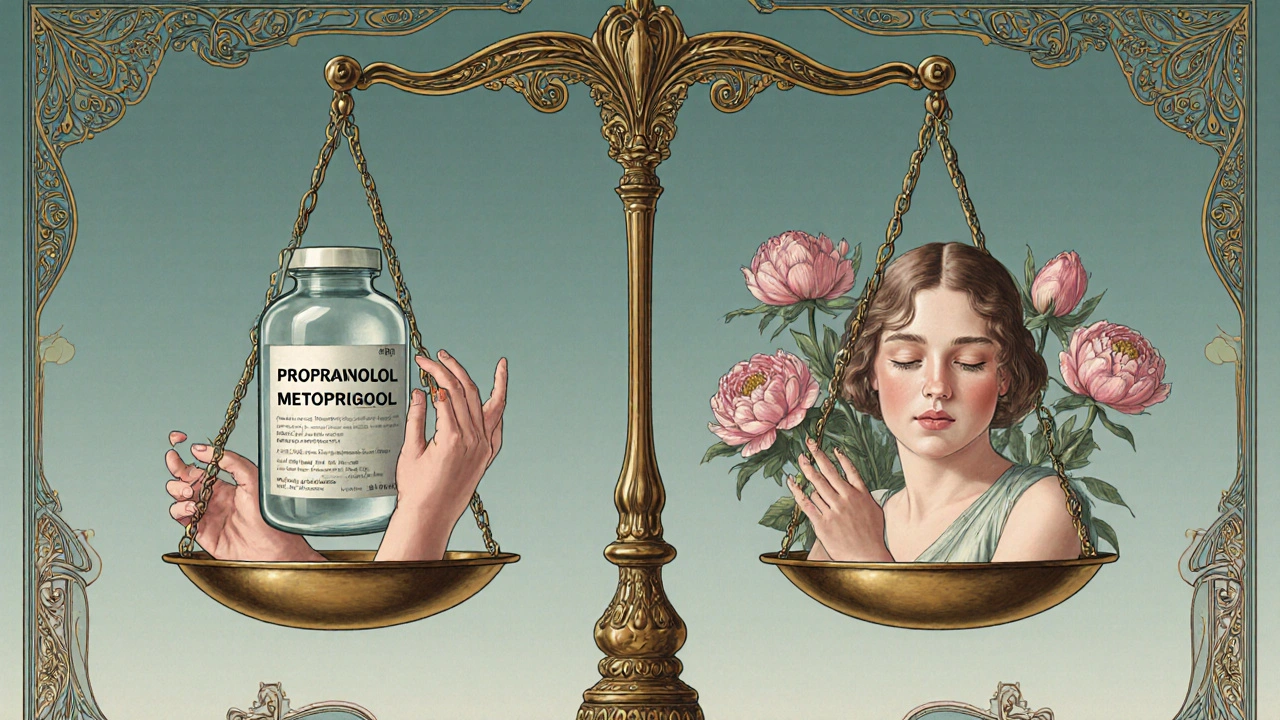Beta Blocker Comparison Tool
This tool helps you compare Inderal (propranolol) with alternatives based on your specific condition, side effect concerns, and budget. Answer a few questions to get personalized recommendations.
Your Personalized Recommendations
✓ Your best alternative:
Note: Always discuss medication changes with your doctor. This tool is for informational purposes only and does not replace professional medical advice.
If you’re taking Inderal (propranolol) for anxiety, migraines, tremors, or high blood pressure, you’ve probably wondered: is there a better option? Maybe your side effects are getting worse. Maybe your insurance won’t cover it anymore. Or maybe you just want to know what else is out there. You’re not alone. Thousands of people switch from propranolol every year - not because it doesn’t work, but because something else works better for them.
What Inderal (Propranolol) Actually Does
Inderal is the brand name for propranolol, a beta blocker that slows your heart rate and lowers blood pressure by blocking adrenaline. It doesn’t cure anxiety or high blood pressure - it manages symptoms. That’s why it’s used for:
- Performance anxiety (stage fright, public speaking)
- Essential tremor
- Migraine prevention
- Hypertension (high blood pressure)
- Heart rhythm disorders
It’s a non-selective beta blocker, meaning it hits both beta-1 and beta-2 receptors. That’s why it can help with anxiety and tremors - but also why it might cause fatigue, cold hands, or trouble sleeping. If you’ve had those side effects, you’re not broken. You just might need a different tool.
Atenolol: The Simpler Beta Blocker
Atenolol is a selective beta-1 blocker. That means it mostly targets your heart and less of your lungs and blood vessels. For people who get cold fingers or breathing issues on propranolol, atenolol often feels gentler.
It’s taken once a day, has fewer drug interactions, and doesn’t cross the blood-brain barrier as much - so it’s less likely to cause vivid dreams or depression. But here’s the catch: it doesn’t help with anxiety or tremors as well as propranolol. If your main goal is reducing public speaking nerves, atenolol might leave you disappointed.
Doctors often choose atenolol for pure high blood pressure control, especially in older adults or those with asthma. It’s cheaper, too - often under $5 for a 30-day supply in the U.S. and Australia.
Metoprolol: The Middle Ground
Metoprolol comes in two forms: immediate-release (Lopressor) and extended-release (Toprol XL). The extended-release version is the most common today because it gives steady levels throughout the day.
Metoprolol is also a beta-1 selective blocker, so it’s easier on the lungs than propranolol. But unlike atenolol, it still crosses into the brain enough to help with anxiety and migraine prevention. That’s why it’s a top pick for people who need heart protection and anxiety relief.
Studies show metoprolol works just as well as propranolol for preventing migraines. One 2023 trial in the Journal of Neurology found 62% of patients had at least a 50% drop in migraine days on metoprolol - nearly identical to propranolol’s 65%.
Side effects? Still possible: dizziness, fatigue, low heart rate. But fewer people report cold extremities or sleep issues compared to propranolol.
Nadolol: The Long-Lasting Option
Nadolol is another non-selective beta blocker - just like propranolol - but it lasts longer. One dose sticks around for 24 hours. That means you only need to take it once a day.
It’s often used for hypertension and heart rhythm problems. For people who forget pills, nadolol is a game-changer. But because it’s non-selective, it still carries the same risk of cold hands, fatigue, and bronchospasm as propranolol.
It’s not commonly used for anxiety or tremors because there’s less real-world data supporting it. Most doctors reach for propranolol or metoprolol first when anxiety is the main issue.

Bisoprolol: The Heart-First Choice
Bisoprolol is highly selective for beta-1 receptors. It’s one of the most prescribed beta blockers for heart failure and high blood pressure in Australia and Europe.
It’s gentle on the lungs and rarely causes drowsiness or nightmares. But it doesn’t touch beta-2 receptors - so it won’t help with tremors or performance anxiety. If you’re taking a beta blocker just for your heart, bisoprolol is often the safest long-term option.
It’s also less likely to interact with asthma medications or diabetes drugs. If you have COPD or type 2 diabetes, your doctor might push you toward bisoprolol over propranolol.
Non-Beta Blocker Alternatives
Not everyone needs a beta blocker. Depending on your condition, other classes of drugs might work better.
For Anxiety: SSRIs and SNRIs
Propranolol helps with the physical symptoms of anxiety - racing heart, shaking hands. But it doesn’t touch the thoughts. For long-term anxiety disorders like social anxiety or generalized anxiety, SSRIs like sertraline or escitalopram are first-line treatments.
A 2024 meta-analysis in The Lancet Psychiatry found SSRIs reduced anxiety symptoms by 50-60% over 12 weeks - compared to 30-40% for propranolol. Propranolol is great for situational anxiety (like a speech or exam). SSRIs are better if you’re anxious most days.
For Migraines: Topiramate and CGRP Inhibitors
Topiramate (Topamax) is an antiseizure drug that’s FDA-approved for migraine prevention. It’s just as effective as propranolol but comes with brain fog and tingling fingers as common side effects.
Newer drugs like erenumab (Aimovig) or fremanezumab (Ajovy) block a protein called CGRP that triggers migraines. They’re injectables, cost around $600/month, and aren’t covered by all insurance plans. But for people who can’t tolerate beta blockers, they’re a breakthrough.
For High Blood Pressure: ACE Inhibitors and Diuretics
If your main issue is high blood pressure, you might not need a beta blocker at all. ACE inhibitors like lisinopril or ARBs like losartan are now preferred first-line treatments. They’re gentler on metabolism and don’t cause fatigue or sexual side effects as often.
Thiazide diuretics like hydrochlorothiazide are even cheaper and work well for older adults. Many people take a low-dose diuretic plus an ACE inhibitor - not a beta blocker.
Comparison Table: Propranolol vs. Top Alternatives
| Medication | Type | Best For | Side Effects | Dosing | Cost (AUD, 30-day) |
|---|---|---|---|---|---|
| Propranolol (Inderal) | Non-selective beta blocker | Anxiety, tremors, migraines, hypertension | Fatigue, cold hands, sleep issues, low heart rate | 2-4 times daily | $15-$25 |
| Atenolol | Beta-1 selective | Hypertension only | Mild fatigue, dizziness | Once daily | $5-$10 |
| Metoprolol (Toprol XL) | Beta-1 selective | Anxiety, migraines, hypertension | Dizziness, fatigue, rare nightmares | Once daily | $10-$20 |
| Nadolol | Non-selective beta blocker | Hypertension, arrhythmias | Similar to propranolol | Once daily | $12-$20 |
| Bisoprolol | Beta-1 selective | Hypertension, heart failure | Mild dizziness, low heart rate | Once daily | $10-$18 |
| Sertraline (Zoloft) | SSRI | Chronic anxiety, depression | Nausea, insomnia, sexual side effects | Once daily | $12-$25 |
| Lisinopril | ACE inhibitor | Hypertension, heart protection | Cough, dizziness, high potassium | Once daily | $5-$12 |

When to Stick With Propranolol
Don’t assume a newer or pricier drug is better. Propranolol still has unique strengths:
- If you have performance anxiety - it’s the gold standard for quick, situational relief.
- If you have essential tremor - it’s one of the few drugs proven to reduce shaking.
- If you’re on a tight budget - it’s widely available as a generic and often covered.
- If you’ve tried other beta blockers and they didn’t work - propranolol might be the one that finally clicks.
Many people switch away from propranolol too soon. Give it 4-6 weeks before deciding it’s not for you. Side effects often fade as your body adjusts.
When to Switch
Consider switching if:
- You have asthma or COPD - non-selective beta blockers like propranolol can trigger breathing attacks.
- You’re diabetic - propranolol can hide signs of low blood sugar.
- You’re depressed or have sleep problems - propranolol can make both worse.
- You’re taking other meds that interact - like fluoxetine or antacids.
- Your doctor says your blood pressure is controlled, but you’re still taking propranolol for anxiety - an SSRI might be a better fit.
What to Ask Your Doctor
Before making any changes, talk to your prescriber. Here’s what to say:
- “I’m having [side effect]. Is there a beta blocker with fewer of these?”
- “I take this for [reason]. Is there a drug that targets that more directly?”
- “Is there a cheaper or once-daily option?”
- “Would an SSRI or ACE inhibitor be safer for me long-term?”
Don’t stop propranolol cold turkey. Suddenly stopping can cause rebound high blood pressure, chest pain, or even a heart attack. Always taper under medical supervision.
Final Thoughts
There’s no single “best” beta blocker. Propranolol is powerful, but it’s not perfect. Atenolol is simpler for blood pressure. Metoprolol strikes a balance. Bisoprolol is safer for the heart. And sometimes, you don’t need a beta blocker at all.
The right choice depends on your body, your symptoms, and your life. If you’re tired of side effects or feel like your medication isn’t fitting your life anymore - you’re not failing. You’re just looking for a better fit. Talk to your doctor. Try one alternative. Give it time. And remember: you’re not stuck with the first pill they gave you.
Can I switch from Inderal to metoprolol on my own?
No. Never switch beta blockers without medical supervision. Stopping propranolol suddenly can cause dangerous spikes in blood pressure or heart rate. Your doctor will slowly reduce your dose while gradually introducing the new medication. This usually takes 1-2 weeks.
Is propranolol better than atenolol for anxiety?
Yes, for situational anxiety like public speaking or performance nerves. Propranolol crosses the blood-brain barrier more easily, helping reduce physical symptoms like trembling and rapid heartbeat. Atenolol doesn’t cross as well, so it’s less effective for anxiety - even though it’s better for pure high blood pressure.
Does propranolol cause weight gain?
Some people gain a little weight on propranolol - usually 1-3 kg - because it can slow metabolism and reduce physical activity due to fatigue. It’s less common than with older beta blockers like atenolol, but it happens. Switching to bisoprolol or metoprolol often helps if weight gain is a concern.
Are there natural alternatives to propranolol for anxiety?
No natural remedy replaces propranolol’s speed and reliability for acute anxiety. Magnesium, L-theanine, or passionflower may help mild stress, but they won’t stop a racing heart before a presentation. For long-term anxiety, therapy and SSRIs are proven alternatives. Don’t rely on supplements if you need real symptom control.
How long does it take for propranolol to work for migraines?
It can take 4-8 weeks to see full migraine prevention effects. You won’t feel better right away. Doctors usually start at 20-40 mg daily and increase slowly. If you don’t notice fewer headaches after 2 months, it’s time to talk about switching options.
Can I take propranolol with coffee?
Caffeine can reduce propranolol’s effectiveness and increase heart rate - which defeats the purpose. Limit coffee to one cup a day, and avoid energy drinks or large amounts of caffeine. If you’re taking it for anxiety or tremors, cutting caffeine often makes a bigger difference than you expect.
If you’ve been on propranolol for months and still feel like something’s off - you’re right to question it. Your body changes. Your needs change. And so should your treatment. Talk to your doctor. Try one alternative. And don’t settle for a pill that doesn’t fit your life.


11 Comments
Man, I’ve been on propranolol for my stage fright for years and honestly? It’s been a game-changer. I used to sweat through my shirt before giving a presentation, now I can walk up there like I’m ordering coffee. But yeah, the fatigue is real - I nap after lunch like it’s my job. Tried metoprolol last year and it felt like my brain finally stopped being wrapped in cotton. Still shakes a little, but not enough to drop my mic. If you’re on the fence, give it a shot - just don’t rush the switch. Your heart will thank you.
Let’s not romanticize beta blockers as some magical fix - they’re pharmacological band-aids for systemic issues. Propranolol masks autonomic hyperactivity, sure, but it doesn’t address the neurochemical dysregulation underlying chronic anxiety. SSRIs? They modulate serotonin reuptake, which over time rewires maladaptive fear circuits. You’re not ‘just’ managing symptoms - you’re potentially altering neuroplasticity. And before you say ‘but propranolol works faster’ - yes, because it’s a blunt instrument. SSRIs are precision tools. If you’re taking propranolol for daily anxiety and not an SSRI, you’re treating the smoke, not the fire.
Anyone else notice how everyone says metoprolol is better but no one mentions the dizziness? I took it for two weeks and felt like I was walking through syrup
It’s frankly irresponsible to suggest metoprolol as a direct substitute without acknowledging its inferior efficacy for tremor suppression. The literature is unequivocal: propranolol’s non-selective antagonism of β₂ receptors is indispensable for essential tremor. Atenolol and bisoprolol? They’re for hypertensive patients who can’t tolerate the CNS effects - not for performers, musicians, or anyone who needs fine motor control. Your doctor is not your therapist. Don’t trade clinical precision for convenience.
I switched from propranolol to bisoprolol after gaining 5kg and feeling constantly drained. The fatigue vanished. My hands stopped freezing in winter. I still get anxious before meetings, but now I can breathe through it. I don’t need a drug to silence my body - just to quiet the noise enough so I can do the work. No drama. No hype. Just… better living.
As someone who grew up in a household where ‘meds were for weak people’ - I’m still amazed how much propranolol changed my life. My mom thought I was giving up by taking it. But I didn’t give up - I just stopped fighting my own nervous system. Now I play piano in public. I give talks. I travel. I didn’t change. The medicine just stopped my body from betraying me. Sometimes the bravest thing you can do is swallow a pill and say: ‘this helps.’
Let’s be honest - the entire pharmaceutical-industrial complex is engineered to keep you dependent. Beta blockers? They’re not ‘treatments’ - they’re corporate tools to pathologize normal human stress. The real solution? Cold exposure, breathwork, and fasting. These have been used for millennia. Propranolol was developed in the 1960s by ICI Pharmaceuticals - a British conglomerate with ties to the military-industrial complex. Coincidence? I think not. Why are you trusting a molecule designed in a boardroom over your own autonomic intelligence? The system wants you medicated. Don’t be complicit.
EVERYONE is ignoring the elephant in the room: propranolol is being quietly phased out because it’s too cheap and too effective. The new CGRP inhibitors? $600/month. Who profits? Big Pharma. Who gets hurt? People who can’t afford it. And the FDA? They approved them because they’re ‘novel.’ Propranolol’s been around since 1964 - it’s not ‘cutting edge’ so it’s being erased. They don’t want you to know you can get a month’s supply for $10. They want you on the $600 shot. Wake up.
Okay but have you seen the FDA’s adverse event reports on CGRP inhibitors? Stroke, MI, suicidal ideation - and they’re marketed as ‘safe’? Meanwhile, propranolol’s been used by millions for 60 years. I’m not saying don’t try new stuff - but don’t let marketing scare you out of something that’s been proven safe. Also - caffeine. Please stop drinking espresso before your beta blocker. You’re fighting your own medicine.
Propranolol makes you gain weight? That’s because you’re lazy. If you were actually exercising and eating clean, you wouldn’t need it. And SSRIs? Those are just chemical crutches for people who can’t handle real life. Stop looking for pills to fix your weakness. Get up. Go outside. Talk to someone. Stop being a medical consumer. You’re not broken - you’re just giving up.
I’m a therapist and I’ve had clients on every one of these meds. What matters most isn’t the drug - it’s the person behind it. Someone with performance anxiety and a history of trauma? Propranolol might be the bridge they need to get to therapy. Someone with hypertension and diabetes? Bisoprolol might be the safest long-term option. There’s no ‘best’ - only what fits your body, your story, and your goals. Please don’t let online debates replace your doctor’s guidance. You’re not alone in this.